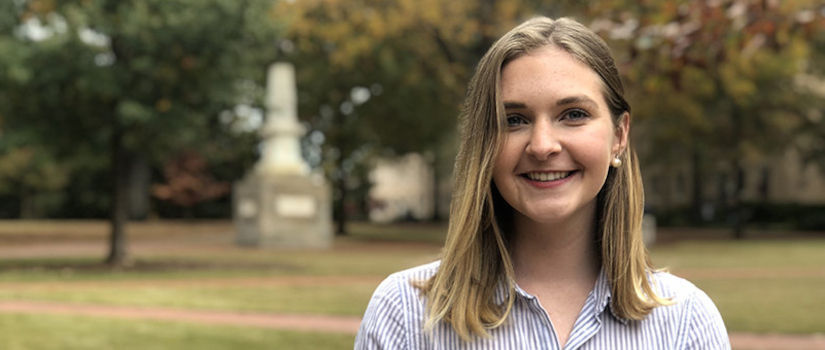What made USC your college of choice?
The three things that I knew I wanted out of a college were a challenging academic environment, a passionate student body, and warm weather so USC really hit all of those marks for me. The Honors College here also allowed me to have the big school feeling that I really wanted in addition to small class sizes and engaging seminars. There is nothing like being in Williams Brice on a Saturday surrounded by thousands of spirited students and then being able to have a 15 person lecture the following Monday–it’s something you can’t find anywhere else.
Why did you choose to pursue History at USC?
I’ve loved History ever since I read Night by Elie Weisel in the fifth grade. After that book, I read books about the Holocaust and World War II like it was my job. It wasn’t until I took AP World History in my sophomore year of high school that I realized that History was something I wanted to make a career out of. My teacher, Mr. Sallese, really instilled in me a passion not just for history but for the academic study of history as well. So I knew going into USC that history was the only major I wanted to pursue.
What has been your favorite History course thus far?
My favorite history course here also happens to be the first one I ever took at USC. History 384 (Jewish History II: From 1500 to the Present), taught by Dr. Andrew Berns was the class that prompted me to declare a Jewish Studies minor. Dr. Berns presented the information in such an engaging way that there was never a moment of silence in an 8:30 am class. The class also dealt exclusively with primary sources which I think is an indispensable aspect of education in History.
What’s the most valuable thing you’ve learned as a History major? How has it changed your life?
The most valuable thing I’ve learned as a history major is how to digest large amounts of information and present it in a clear and understandable way. Too often, academic discourse is inaccessible to many people and I think that accessibility is crucial to the purpose of historical research. The professors that I’ve had at USC have helped to show me this.
How do you spend your time outside of the History Department?
Outside of the History Department, I have two jobs on campus. The first is as the Student Curator for the Artists in Residence Program through the Honors College. The second is as a student assistant for the Oral History department. I am also a member of Phi Alpha Theta, the national history honors society. Apart from all of these things I love going to the river, hiking, and going to the beach with friends.
What are your plans for the future?
After graduating I plan to get a masters in Holocaust and Genocide Studies and then complete a Ph.D. in Jewish Studies and European History.
Favorite Book:
Either Gone with the Wind by Margaret Mitchell or The Awakening by Kate Chopin
Favorite Quote:
“And I asked myself about the present: how wide it was, how deep it was, how much was mine to keep.” This Kurt Vonnegut quote reminds me that there are a multitude of human experiences occurring all at once and that it is more important to make a mark on the present than to leave a legacy for the future.
Where are you from? Any other organizations you’re involved in? What kind of research are you currently working on?
I am from Long Island, New York and I came to USC after graduating from Mount Sinai High School in 2017. In addition to my membership in Phi Alpha Theta, I am also the secretary of Planned Parenthood Generation Action and I sing in the Women’s Choir here at the University. I am currently conducting independent research with the History Department regarding the fate of the Afro-Germans under Nazi rule, specifically a group of mixed-race children from the Rhineland territories.
